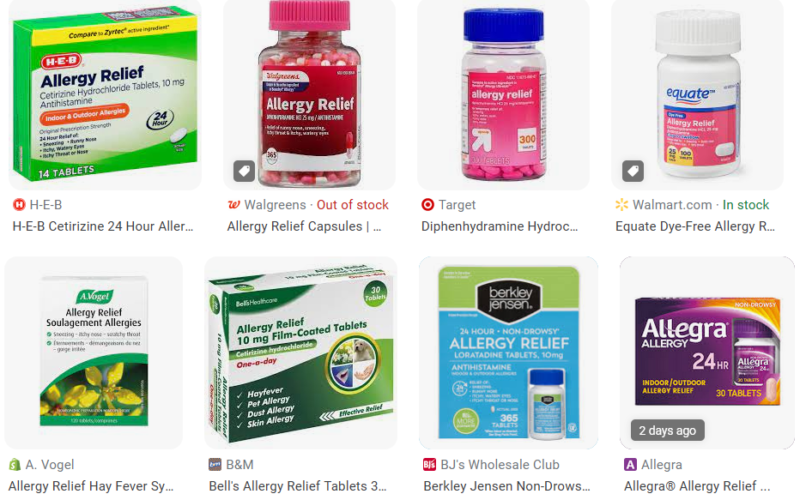Vitamins and Supplements That Help Allergies! Really!

Sick of drug company ads and outrageous claims about allergy relief, especially when your head still feels like a lead balloon?
So am I, and I am just about as tired of “miracle” claims from vitamin and supplement companies. That said, there are actually some vitamins and supplements that have documented allergy-fighting power. Here are the first two on the “hot list.” More to follow on later blogs.
Mangosteen
OK, maybe you haven’t even heard of this one. It’s a fruit, strong in antioxidants. It was touted as a cure for practically everything for a relatively short time and then eclipsed by acai berries. But recent research on mangosteen reveals that it actually inhibits two big allergy mechanisms: IgE mediated mast cell relase of histamines (the process that makes your nose swell and run when you are allergic to cats and get a face full of cat hair).
The second mechanism that mangosteen helps to halt is prostaglandin synthesis. Prostaglandins are “messengers” in the body, made of essential fatty acids, that cause fever, pain and swelling as a protective response in when there is tissue damage. This response can be helpful, but in the case of allergies, it goes “over the top.” Mangosteen can calm down both of these allergy responses–the histamines, the prostaglandins, and all the swelling, sneezing, and mucus that goes with them.
I like Ultra Mangosteen made by Trace Minerals Research. The recommended amount is an ounce a day. If I’m making a smoothie, I throw it in there, otherwise I just measure out an ounce (two tablespoons) and toss it off. You know I’m not going to admit glugging it from the bottle!
Vitamin C
Yes, good old Vitamin C. Linus Pauling did all that great research on it back in the day, and it always seems to me that no one has really paid adequate attention to it. There have also been numerous attempts to discredit it. Linus Pauling discovered three things.
- First, we do not make our own Vitamin C.
- Second, the average person needs 1500 to 2500 milligrams of Vitamin C a day for optimal immune and tissue repair function.
- Third, you only absorb about 500 milligrams of Vitamin C at a time, but it goes out of your body in 2 1/2 to 3 hours.
Bottom line, take at least 500 milligrams, with 6-8 ounces of water, three times a day. You can add more, if you suspect you are one of those people that needs more like 2500 milligrams a day. If you do, just take 500 milligrams 5 times a day instead of 3 times a day. Take it to what Linus Pauling called “bowel tolerance”. If you develop loose bowels, cut back 500 milligrams.
I’ll take on Quercetin, Bromelain and Butterbur in the next blog. In the meantime, you can get up to speed on the Mangosteen and Vitamin C.
Natural sources of Vitamin C
Here are some natural sources:
- Citrus fruits – Oranges, grapefruits, lemons, and limes are some of the most well-known sources of Vitamin C.
- Berries – Strawberries, raspberries, blueberries, and blackberries are good sources of Vitamin C.
- Kiwi – Kiwis are a small but powerful source of Vitamin C, with one kiwi providing about 64 milligrams of Vitamin C.
- Mango – Mango is a tropical fruit that is a good source of Vitamin C, with one cup of mango providing about 60 milligrams of Vitamin C.
- Pineapple – Pineapple is a sweet and juicy fruit that is a good source of Vitamin C, with one cup of pineapple providing about 78 milligrams of Vitamin C.
- Melons – Cantaloupe and honeydew melon are both good sources of Vitamin C, with one cup of cantaloupe providing about 58 milligrams of Vitamin C.
- Guava – Guava is a tropical fruit that is one of the richest natural sources of Vitamin C, with one guava providing about 125 milligrams of Vitamin C.
- Papaya – Papaya is another tropical fruit that is a good source of Vitamin C, with one papaya providing about 120 milligrams of Vitamin C.
- Bell peppers – Bell peppers, especially red and yellow varieties, are a good source of Vitamin C, with one cup of red bell pepper providing about 190 milligrams of Vitamin C.
- Tomatoes – Tomatoes are a good source of Vitamin C, with one medium tomato providing about 22 milligrams of Vitamin C.
Vitamin C is an essential nutrient that is important for many functions in the body, including immune system health, skin health, and wound healing. Vitamin C is a water-soluble nutrient, and cooking or storage can reduce the Vitamin C content of these foods. Eating a variety of these fruits and vegetables can help to ensure adequate Vitamin C intake.









